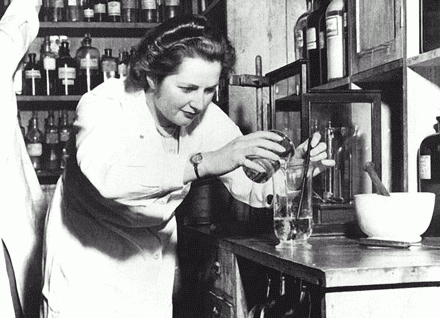Margaret Thatcher, Iron Scientist: Chemist-Turned-PM Not Exactly Beloved By Research Community

Scientists in the U.S. and elsewhere often bemoan the lack of scientists in political office. It’s not a new complaint: Plato said in "The Republic" that the best government is one where kings study philosophy, or where philosophers become kings.
The late Margaret Thatcher, an Oxford-trained chemist whose official coat of arms features Isaac Newton, may be one of the most powerful scientific researchers to rise to power. Yet with her political track record on research funding and climate change, not many scientists are rushing to memorialize her as a champion of science.
“She viewed science as a source of wealth, and therefore as a justified expenditure from the public purse,” University College London researcher Jon Agar wrote in a comprehensive examination of Thatcher’s scientific career published in the Notes and Record of the Royal Society in 2011. “Yet this elevation made science even more of a test case for her developing views on economic liberalism. If markets could work for science policy, they could work anywhere.”
There’s a popular myth that Thatcher’s research laid the groundwork for the creation of soft-serve ice cream. But according to The New Yorker, soft-serve started up in the U.S. about a decade before Thatcher set foot in the food laboratory. Plus there’s little evidence that her work with food conglomerate J. Lyons & Company was actually that instrumental – at best, she was working there when the company was trying to refine existing British soft-serve recipes that would work well in U.S.-made machines.
“It wasn’t Thatcher’s supporters who spread the soft-serve myth; it was the left-wingers, who saw in it a suitable metaphor for her policies,” the New Yorker wrote, referring to the notion that soft-serve was a way to increase profits while decreasing quality.
Thatcher’s postcollege years as an industrial chemist gave her an insider’s view into what research looked like, butit also convinced her that there was a lot of fat to trim in government laboratories. During her tenure as prime minister, austerity measures meant government grants for science were cut and fees for international students at British universities were raised. Instead of distributing grant money to universities in a lump sum for the schools to distribute as they wished, the government earmarked money for specific projects. Overall, there was a shift toward encouraging science that could produce immediate, marketable effects. It's sound policy to the conservative thinker: Make sure the public gets some value for its tax dollars (or pounds).
But many scientists objected, saying the seachange gave short shrift to basic research that could pay much higher dividends down the road.
Thatcher’s particular scientific background – in private companies, and not in the academy – may be one of the more important stations on her political journey.
“In the early 1970s, Thatcher as the minister responsible for science under Heath, had to confront and in the end endorsed radical market language for discussing science policy,” Agar wrote for the Guardian last week. “It was one step toward Thatcher becoming a Thatcherite, and it would not have happened if she hadn't had working, inside knowledge of industrial, profitable science.”
Science research funding in the U.K. has increased under subsequent administrations, but Thatcher’s move toward emphasizing the market value of science lingers. The Research Excellence Framework, which the U.K. government uses to evaluate university research projects, favors quicker, marketable science. Charles Darwin, who spent five years traveling, comparing finch beaks and ruminating on Patagonian geology, would not likely have been rated highly by the REF, according to British biologist Denis Noble.
“In a roundabout way, the Thatcher government did U.K. scientists a service,” Noble wrote in a column for Nature on Tuesday. “The shock of a threat to the science base was probably necessary to provoke us to take action and to create a permanent organization to present the case for funding science and engineering.”
For a period of time in the late 1980s, Thatcher was a veritable green warrior. In a 1989 speech to the UN, she called for world nations to take action on climate change and highlighted the dangers of increasing greenhouse-gas emissions.
“Put in its bluntest form: The main threat to our environment is more and more people, and their activities,” Thatcher said.
But later in life, Thatcher made a hard 180-degree turn. Her 2003 book, “Statecraft,” basically disavows her previous calls to action. Many of the sources Thatcher cites in the book’s chapter on climate change come from right-wing U.S. think tanks like the Heritage Foundation and the Cato Institute, and it is light on citations of scientific papers, climate researcher Bob Ward wrote in 2010 for the Guardian.
Thatcher’s change of heart does seem more politically motivated than scientifically inspired.
"The new dogma about climate change has swept through the left-of-centre governing classes," she wrote in “Statecraft.” Thatcher also claimed that the movement to address global warming "provides a marvelous excuse for worldwide, supra-national socialism."
Got a news tip? Send me an email: r.palmer@ibtimes.com Follow me on Twitter: @rpalmerscience
© Copyright IBTimes 2025. All rights reserved.





















